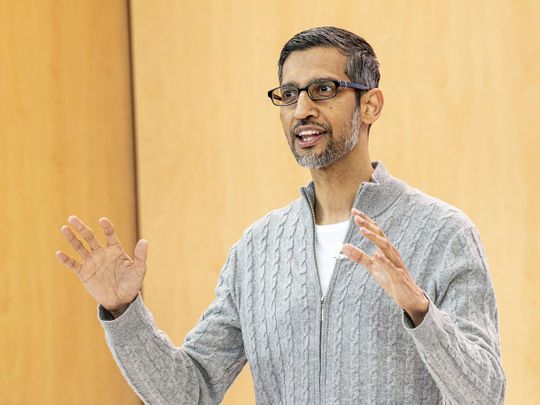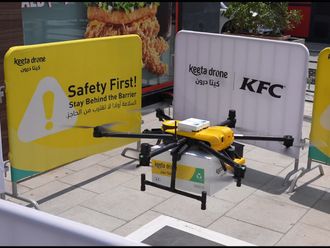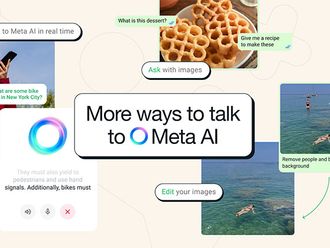
Mountain View, California: Alphabet Inc's Google rolled out more artificial intelligence for its core search product, hoping to create some of the same consumer excitement generated by Microsoft Corp's relaunch of rival search engine Bing in recent months.
At its annual I/O conference in Mountain View, California, on Wednesday, Google offered an updated version of its namesake engine. Called the Search Generative Experience, the new Google can craft responses to open-ended queries while retaining its recognizable list of links to the Web.
"We are reimagining all of our core products, including search," Sundar Pichai, Alphabet's CEO, said after he took the stage at the event.
He said Google is integrating generative AI into search and other products, including Gmail, where it can create draft messages, and Google Photos, where it can make major changes to images.
US consumers will gain access to the Search Generative Experience in the coming weeks via a wait list, a trial phase during which Google will monitor the quality, speed and cost of search results, Vice President Cathy Edwards said.
Bard vs ChatGPT
Google's foray into what is known as generative AI comes after the startup OpenAI introduced ChatGPT, the darling chatbot of Silicon Valley that launched a furious funding race among would-be competitors. Generative AI can, using past data, create brand new content like fully formed text, images and software code.
OpenAI, backed by billions of dollars from Microsoft and now integrated into Bing search, has become for many the default version of generative AI, helping users spin up term papers, contracts, travel itineraries, even entire novels.
For years the top portal to the internet, Google has found its own perch in question since rivals began exploiting the technology as an alternative to presenting content from the Web.
At stake is Google's slice of the gigantic online advertising pie that the research firm MAGNA estimated at $286 billion this year.
In an interview, Edwards said Google's aim was to employ generative AI to reduce steps for consumers to make decisions and to let people ask a broader set of queries, including creative ones. Addressing how AI can spout incorrect information, Edwards said the company prioritized accuracy and citing trusted sources.
"AI can provide insight," Edward said. "But what fundamentally people want at the end of the day is to be connected to information from real people and organizations, knowing, for example, that this health information comes from the WHO," or the World Health Organization.
What outfit to wear
With the embedded AI, Google still looks and acts like its familiar empty search bar.
Generally available will be a new filter called "Perspectives" spotlighting blogs, videos and content from social media, the company said. Google also will mark up images the company generates with AI and make it easier for consumers to vet a picture's authenticity, it said.
But while a search for "weather San Francisco" will as usual point a user to an eight-day forecast, a query asking what outfit to wear in the California city prompts a lengthy response generated by AI, according to a demonstration for Reuters earlier this week.
You should bring layers, including a short-sleeved shirt and a light sweater or jacket for the day" the result stated, including links to websites where it gleaned such advice.
Searches for news or to navigate to a specific website did not result in a response by generative AI, though users can prompt a chat and press a button for a follow-up query, the demonstration showed.
Bing's search, through its partnership with OpenAI, can summarise web pages, synthesize disparate sources, compose emails and translate them. Microsoft has said every percentage point of share it gains in search advertising could draw another $2 billion in revenue.
While Bing has commanded no more than one-tenth of the search market, according to estimates, Google has practically the rest of that to defend. This means any hit to the reliability of its search engine could carry a big consequence.
Generative AI programs have been found to create false or misleading results absent grounding in reliable answers.
Another challenge is the high expense of drawing on such AI, known as large language models. Edwards said, "We and others are working on a variety of different ways to bring down the cost over time." Ads will remain a central part of the experience, Edwards said. "We only get paid when there's a click."
What’s ahead for Bard?
Google's AI chatbot Bard, which is seen as the company's answer to ChatGPT, is opening up to all who want to use it and adding new features.
Google is aiming for parity with its biggest competitor, Microsoft's Bing chatbot, which dispensed with its waitlist earlier this month.
Now, Google is launching Bard in 180 countries and territories, with plans to expand its support to 40 languages, the company said. Sissie Hsiao, Google's vice president of product for Bard, said that Bard is now available in Japanese and Korean and will soon extend to more languages.
In order to let users more easily transfer over answers from Bard, Google on Wednesday said it would let users export responses from the chatbot to Gmail and Google Docs.
Soon, users will also be able to prompt the chatbot with images, the company said "- another feature that Microsoft recently announced for its Bing search engine.
Bard will also soon connect to more apps from Google and third-party companies, the company said. Partnerships are coming soon with companies including Adobe, Kayak and Instacart. And Google said it would add features to make it easier for developers to work with Bard to write code and complete other tasks.
Google debuts language model PaLM 2 touting language, math skills (10:13 AM Pacific)
On Wednesday, Google introduced a new large language model known as PaLM 2 that it said had already been woven into many of its marquee products.
PaLM 2 was trained on massive quantities of text from across the web. The model was also trained on coding language and mathematical data, helping it fare better with logic and math problems, Google said. As some in the field of AI have noted how OpenAI's ChatGPT struggles with word problems, the new model from Google is expected to be evaluated closely for its performance against OpenAI's technology.
Google is releasing the model in various sizes, and the smallest can be used on mobile devices, the company said.






_resources1_16a30b3fb8b_small.jpg)




